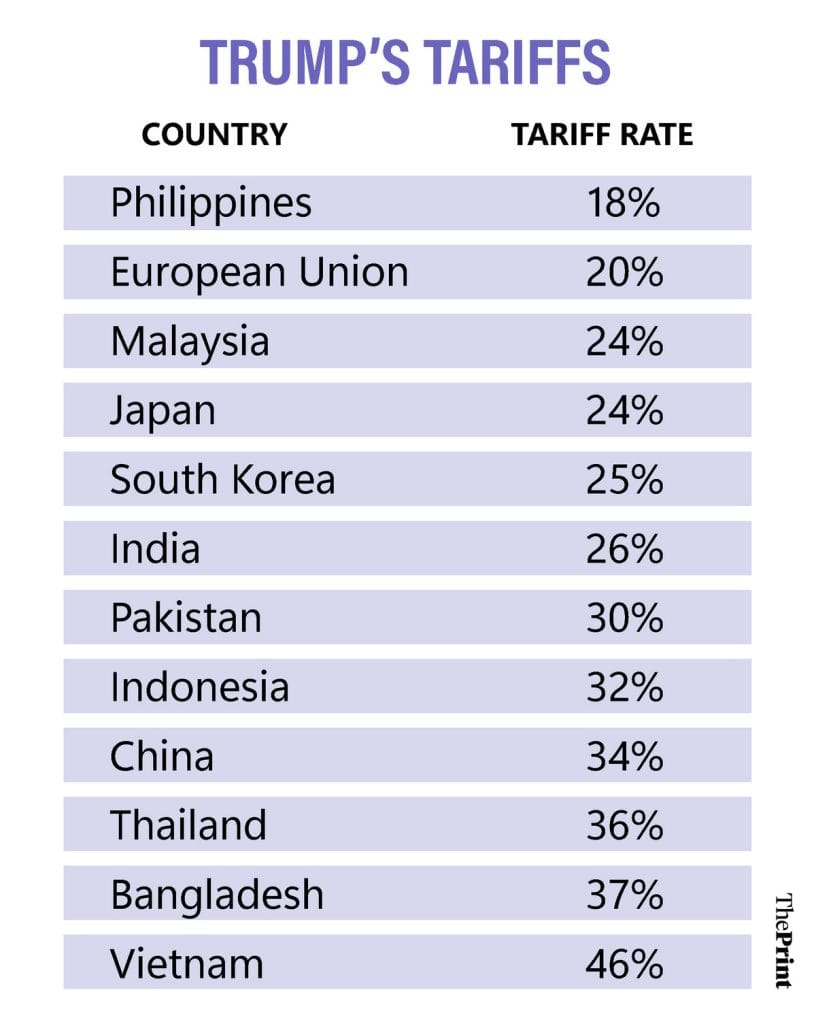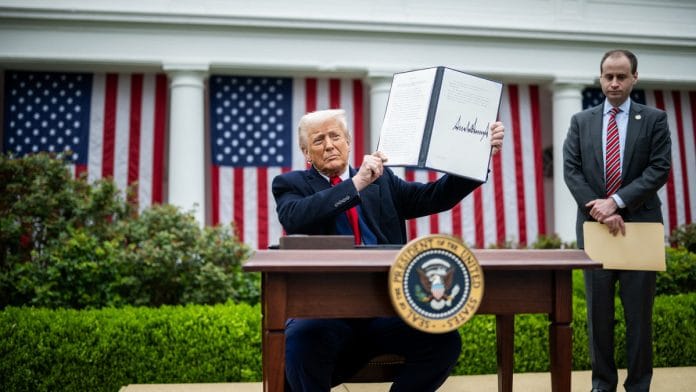As predicted, Liberation Day is here. Trump is bringing chaos to the world economy—and to India—with his punitive trade tariffs on the US’ major trading partners. As the global stock selloff indicates, the tariffs will cause an immediate dip in global trade unless countries offer concessions to forestall the 9 April deadline for reciprocal tariffs. The fact that the Indian market only dipped moderately suggests that a compromise is expected.
Trump is playing what economist Thomas Schelling called a ‘commitment game’—a player locks themselves into a risky strategy that would be politically costly to reverse unilaterally in an effort to push opponents to compromise.
Clearly, Trump thinks that his signal of resolve, and his willingness to accept the economic costs of a trade war, will push other countries to compromise. The fact that these steps are irrational economically is beside the point.
So, what should India do?

Also Read: India’s deadly combo—market plunge, unemployment, stagnant wages & rising personal debt
Protections without protectionism
First, avoid knee-jerk reactions that hurt Indian companies, such as duty cuts on bourbon whisky and Harley-Davidson motorcycles, or orders for Javelin missiles and Stryker armoured vehicles announced by Prime Minister Narendra Modi in February during his US visit. These damaged the interests of Indian companies making similar products (goodbye Atmanirbhar Bharat) and didn’t stop Trump from criticising India’s tariffs in the PM’s presence; also previously labelled India as a “tariff abuser”.
India should instead use this crisis to reverse the disturbing trend of greater protectionism in recent years, which has hurt consumers and only helped the large monopolies that have close links to Modi.
Second, protect vulnerable sections such as Indian farmers, who have to cope with extreme commodity price volatility even with high tariffs. Third, ensure that growing sectors like automobiles—developed over decades—are not casually sacrificed to appease Trump or Elon Musk, or even Chinese companies smart enough to tie up with Indian firms close to Modi.
Inaction is not an option given how vulnerable India is to US action. The US is the only major trading partner with whom India has a trade surplus, which hit a record $46 billion in 2024, more than double what it was in 2018. Nineteen per cent of Indian exports (April–December 2024) go to the US, while only about 2 per cent of US exports go to India.
Also Read: Thank you Trump for putting tariff gun to India’s head. That’s the only way we’d be forced to reform
An opportunity to dismantle cronyism
Theoretically, a trade war between the United States and China could help India. Companies have pursued “China Plus One” policies for some years now, reducing their supply chain dependence on China by investing in alternative emerging markets. But as the NITI Aayog has admitted, companies have chosen to invest in more investment-friendly countries like Vietnam, Thailand, Cambodia, and Malaysia. These countries have been the main beneficiaries because of cheaper labour, simpler taxes, lower tariffs, and more free trade agreements. The tariff differential between China and India (and even those countries) may not be big enough to change this dynamic in a fundamental way.
The core problem with promoting manufacturing and trade in India has been cronyism-driven protectionism. According to economist Shoumitro Chatterjee and former Chief Economic Advisor Arvind Subramanian, India implemented approximately 3,200 tariff hikes since 2015. Notably, in 2018 alone, the country’s average tariff rate surged from 13 per cent to 18 per cent in a single year. Former RBI Deputy Governor Viral Acharya has written about how the concentration of economic power (measured both by assets and sales) of India’s top five conglomerates has contributed to price increases. One mechanism for this, he notes, is their power to lobby for higher import duties.
For instance, Indian garment exports have been eclipsed in recent years by China, Bangladesh, and Vietnam. One reason is that inputs like polyester attract higher import duties in India. This benefits chemical monopolies at the expense of a large number of small and medium businesses that could be hiring lakhs more workers.
There’s no point talking about India participating in global value chains while you raise tariffs and thereby make it more difficult to do so.
Let’s not forget what former US Trade Representative under the first Trump administration, Robert Lighthizer, tellingly wrote in his memoir No Trade Is Free: “When I was in negotiations with Indian officials, I kept a copy of the biography of each of the country’s fifteen or so billionaires on my desk. In predicting Indian government positions, I would look to the interests of these men.”
It’s not just the BJP’s model of political finance that seems to be driving protectionism. Unlike former PM Dr Manmohan Singh and former Finance Minister P. Chidambaram, PM Modi and Finance Minister Sitharaman seem to have little understanding of how important global trade growth has been to India’s economic growth. Economist Arvind Panagariya, who has worked closely with the Modi government, has himself described Modi’s trade policy as a folly, pointing out how the Indian economy grew during the much more open UPA period. The fact is that India’s share of global trade almost doubled under the UPA to 1.7 per cent, and has stayed around that mark during the Modi decade.
Trump’s tariffs are an opportunity to reverse the politically and ideologically bankrupt path of crony-driven protectionism. Let’s hope the PM finally listens to the large army of economists who have been trying to grab his attention, rather than the large army of lobbyists to whom he has been giving his heart and soul.
Amitabh Dubey is a Congress member. He tweets @dubeyamitabh. Views are personal.
(Edited by Asavari Singh)






